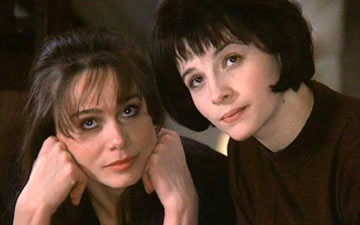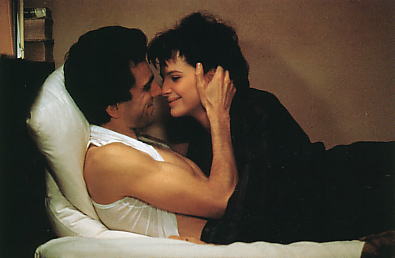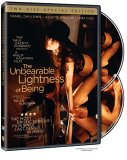| Reviews & Columns |
|
Reviews DVD TV on DVD Blu-ray 4K UHD International DVDs In Theaters Reviews by Studio Video Games Features Collector Series DVDs Easter Egg Database Interviews DVD Talk Radio Feature Articles Columns Anime Talk DVD Savant Horror DVDs The M.O.D. Squad Art House HD Talk Silent DVD
|
DVD Talk Forum |
|
|
| Resources |
|
DVD Price Search Customer Service #'s RCE Info Links |
|
Columns
|
|
|
Unbearable Lightness of Being, The
A film of almost mythical beauty Phillip Kaufman's The Unbearable Lightness of Being tells the story of a young doctor entangled in a web of uncontrollable passion, social upheaval, and the madness of a time consumed by political hatred. Tomas (Daniel Day Lewis) is a successful surgeon in Prague where he shares an interesting relationship with Sabina (Lena Olin), a painter who enjoys her unbridled sexuality. Together Tomas and Sabina have achieved an almost idyllic balance providing for each other what they could not otherwise have as individuals. From the pseudo-intellectual conversations to the passionate sexual interludes they indulge in the two lovers live in a world where everything appears to be perfect.
While on a short trip to the Czech countryside Tomas encounters Tereza (Juliette Binoche), a shy and stunningly beautiful waitress. They strike a conversation, have a drink together, and soon afterwards Tomas goes back to the city. Months later Tereza appears at Tomas' flat in Prague and he allows her to spend the night with him.
Set in the beautiful city of Prague only days before the notorious Russian invasion of 1968 The Unbearable Lightness of Being manages to accomplish what very few films have been able to achieve- a realistic portrait of a country manipulated by false politics. Phillip Kaufman walks us into a world where certainly the people we see desire the usual things: happiness, love, prosperity. We see that before political demagogy sets its roots in Prague just about everything seems "normal"- people meet, fall in love, and share their lives together.
Little by little however The Unbearable Lightness of Being veers off in a direction where love and happiness are being quickly replaced by oppression and uncertainty. The three main characters we are introduced to, Tomas, Sabina, and Tereza, all represent fragments of a world which looks deceivingly peaceful. Under the playful sexual exploits of Tomas we sense a desire to block the rhythm of a reality where very few things are real. Logically, Tomas falls for a woman that is as liberated and disconnected from reality as he is. Tereza, the shy waitress which is soon to become a passionate photographer represents the alarming awareness which both Tomas and Sabina seem to be lacking at the time. Interestingly enough, until Tereza visits Tomas in Prague nothing suggests that she would be the social barometer in The Unbearable Lightness of Being.

Once the seductive ménage a trois in Phillip Kaufman's film is introduced and the audience is allowed ample time to grasp the strengths and weaknesses of the three characters The Unbearable Lightness of Being transforms into a film with a clear social agenda. Kaufman recreates perfectly the staggering world of communist Prague in a way I have only witnessed in Jan Sverak's Kolya (1996). Seeing the Czech youth confronting the Russian invaders, and knowing what the consequences of the Prague Revolution were, always delivers a strange suffocating feeling in me. Indeed, Kaufman's camera reveals more than what he probably intended.
I always viewed The Unbearable Lightness of Being as a film about people making unusual choices under most unusual circumstances. I suppose this is a rather different take on this film somewhat dismissing the more common notion of it being a natural recreation of Milan Kundera's erotic novel. Certainly anyone vaguely familiar with the now defunct Eastern European block would conclude that the love affair between Sabina and Tomas, and later on Tereza, is what this film was meant to recreate. For me personally, however, The Unbearable Lightness of Being was a film that forced me to relive a time which I often look at with a sense of bitter nostalgia. A time during which so many people lost what Phillip Kaufman's film is full of…a passion for life.

Awards/ Recognition:
Oscar nominations for Best cinematography (Sven Nykvist) and Best Writing, Sreenplay Based on Material from Another Medium (Jean-Claude Carriere/ Philip Kaufman) (1989), BAFTA Award-Best Sreenplay; Winner of the Independent Spirit Award for Best Cinematography; and nominated for Golden Globe Award-Best Motion Picture-Drama, and Best Performance by an Actress in a Supporting Role in a Motion Picture (Lena Olin).
How Does the DVD Look?
Before I begin my evaluation of the WB R1 disc of The Unbearable Lightness of Being allow me to reconfirm my opinion that there is not a deserving print of this magnificent film (regardless of the region coding) thus I was eagerly anticipating to put my hands on this review copy hoping that the always reliable Warner Brothers will deliver (as they always do with their double SE).
Presented in an aspect ratio of approximately 1.78:1 and enhanced for widescreen TV's this new WB release is without a doubt a huge disappointment for anyone hoping to finally own the definitive version of Kaufman's film. First of all this new print appears slightly cropped on the top (the original aspect ratio is indeed 1.85:1) although preliminary specs indicated a print in the original aspect ratio of 1.85:1. While some may consider this to be just a tiny detail the difference is quite noticeable, at least to my eyes, and it is most definitely worth pointing out.
The bigger disappointment however comes from the actual film elements that have been provided for this new special edition. Offering plenty of dirt, digital noise, and a disturbingly inconsistent degree of film contrast the DVD looks about average compared to what we have come to expect from WB. Plenty of shimmering and a good dose of color bleeding also indicate that the region 1 release has been probably delivered from the same master responsible for the hugely disappointing pan-European release of this film. Needless to say there has been little restoration work, if any, provided for this new North American special edition.
For those that might have any doubts regarding the poor state of the print herein discussed I suggest that you take a close look at the beginning of Chapter 10. A beautiful glance at the city of Prague reveals a picture that is so inconsistent you could literally see your screen jumping. Considering the spectacular job WB did with much older films such as Doctor Zhivago I am stunned that they did not bother looking either for a better print or providing some substantial restoration work. The only aspect of this presentation that I somewhat approve is the faithful color reproduction which was a major issue for me with the now out-of-print Criterion disc. Nevertheless, I am hugely disappointed that what we are offered is indeed a mediocre print that is not a substantial improvement over the unfaithful Criterion disc.
Despite of the optimism expressed by other reviewers I can not recommend that you upgrade with this new special edition. On the contrary, I would advise that you simply pick the lesser evil: either stay with your Criterion disc and tolerate the faulty color scheme or, pick this new SE edition for the corrected colors but live with the "adjusted" aspect ratio and with the fact that the film has been spread over two discs.
How Does the DVD Sound?
Presented with its original English language track in 2.0 Dolby Digital Surround and an odd French dub in Dolby Digital Surround the WB disc offers the same sound quality found on the Criterion disc. There are no noticeable issues with the audio presentation to warrant any further discussion. With optional English, French, and Spanish subtitles.
Extras:
Thankfully the WB version of this film has ported the excellent commentary by director Phillip Kaufman, editor Walter Murch, Lena Olin, and Jean-Claude Carierre that could be found on the Criterion disc. This is an excellent journey through the history of this film, the manner in which it was adapted from the novel, and the impact it had throughout Europe. Indeed an invaluable look at this modern day masterpiece. Next, there is a brand new Making of documentary which puts the film within the context of the Russian invasion of 1968. A mesmerizing look at the history of Czechoslovakia and the part of it used as a background for The Unbearable Lightness of Being. Last but not least there is the theatrical trailer for the film.
Final Thoughts:
To say that I am disappointed with this new special edition of The Unbearable Lightness of Being is probably quite an understatement. Aside from Cinema Paradiso and Doctor Zhivago this film ranks amongst my all time favorites. It meant so much to me as it perfectly captured a period of my life like no other film has and to see its North American release receive such a shabby effort is quite a letdown. I was looking forward to place Kaufman's film in the DVDTALK's Collector Series however given the lackluster treatment all that I could recommend is that you RENT IT.
|
| Popular Reviews |
| Sponsored Links |
|
|
| Sponsored Links |
|
|
| Release List | Reviews | Shop | Newsletter | Forum | DVD Giveaways | Blu-Ray | Advertise |
|
Copyright 2024 DVDTalk.com All Rights Reserved. Legal Info, Privacy Policy, Terms of Use,
Manage Preferences,
Your Privacy Choices | |||||||














